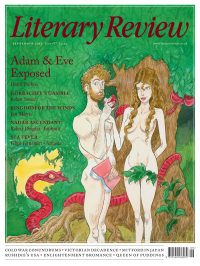Julian Baggini
Meeting of Minds
The Infidel and the Professor: David Hume, Adam Smith, and the Friendship that Shaped Modern Thought
By Dennis C Rasmussen
Princeton University Press 316pp £24.95
Aristotle argued that there were three kinds of friendship – those motivated by utility, by pleasure and by virtue. According to the political scientist Dennis C Rasmussen, the bond between David Hume and Adam Smith was a ‘textbook model’ of the last kind, ‘a stable, enduring, reciprocal bond that arises not just from serving one another’s interests or from taking pleasure in one another’s company, but also from the shared pursuit of a noble end – in their case, philosophical understanding’.
It is hard to think of another friendship involving intellectuals of such calibre. Hume and Smith were the leading figures of the 18th-century Scottish Enlightenment, by common consent, respectively, the greatest philosopher and economist Britain has produced, and arguably the greatest in their fields in the world. Given that, it is perhaps surprising that Rasmussen’s The Infidel and the Professor is the first book to try to tell the story of their relationship.
When the reader discovers the paucity of sources for information about their friendship, however, this book’s uniqueness becomes more understandable. Smith and Hume are known to have exchanged at least 170 letters, but only fifty-six survive, the majority, forty-one, from Hume to Smith. There is little else to fill the

Sign Up to our newsletter
Receive free articles, highlights from the archive, news, details of prizes, and much more.@Lit_Review
Follow Literary Review on Twitter
Twitter Feed
Under its longest-serving editor, Graydon Carter, Vanity Fair was that rare thing – a New York society magazine that published serious journalism.
@PeterPeteryork looks at what Carter got right.
Peter York - Deluxe Editions
Peter York: Deluxe Editions - When the Going Was Good: An Editor’s Adventures During the Last Golden Age of Magazines by Graydon Carter
literaryreview.co.uk
Henry James returned to America in 1904 with three objectives: to see his brother William, to deliver a series of lectures on Balzac, and to gather material for a pair of books about modern America.
Peter Rose follows James out west.
Peter Rose - The Restless Analyst
Peter Rose: The Restless Analyst - Henry James Comes Home: Rediscovering America in the Gilded Age by Peter Brooks...
literaryreview.co.uk
Vladimir Putin served his apprenticeship in the KGB toward the end of the Cold War, a period during which Western societies were infiltrated by so-called 'illegals'.
Piers Brendon examines how the culture of Soviet spycraft shaped his thinking.
Piers Brendon - Tinker, Tailor, Sleeper, Troll
Piers Brendon: Tinker, Tailor, Sleeper, Troll - The Illegals: Russia’s Most Audacious Spies and the Plot to Infiltrate the West by Shaun Walker
literaryreview.co.uk